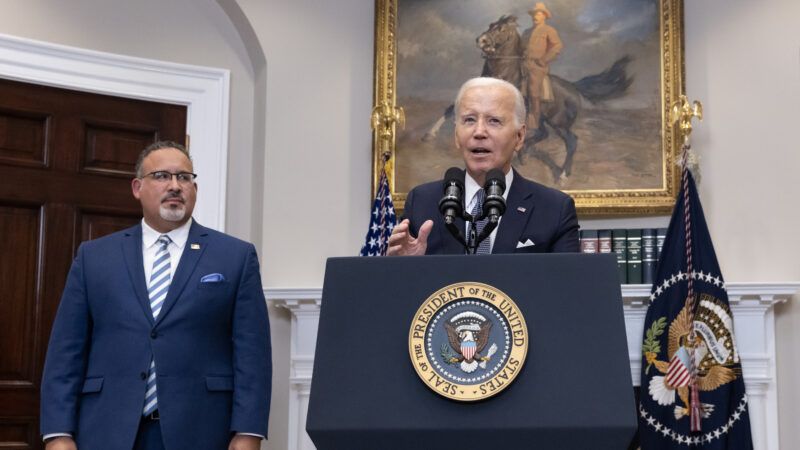New Title IX Rules Erase Campus Due Process Protections
The new rules allow students to be found guilty of assaulting a classmate without ever seeing the full evidence against them.

On Friday, the Biden administration unveiled final Title IX regulations, nearly two years after the administration proposed dramatic changes to how colleges handle sexual assault allegations. The new rules largely mirror proposed regulations released last year and will effectively reverse Trump-era due process reforms.
According to the final regulations, accused students will lose their right to a guaranteed live hearing with the opportunity to have a representative cross-examine their accuser. This is accompanied by a return to the "single-investigator model," which allows a single administrator to investigate and decide the outcome of a case.
Further, under the new rules, most schools will be required to use the "preponderance of the evidence" standard, which directs administrators to find a student responsible if just 51 percent of the evidence points to their guilt. Schools are also no longer required to provide accused students with the full content of the evidence against them. Instead, universities are only bound to provide students with a description of the "relevant evidence," which may be provided "orally" rather than in writing.
This is a stunning rollback of due process rights for accused students. Under the new regulations, a student can be found responsible for sexually assaulting a classmate because a single administrator believed there was a 51 percent chance he had committed the assault, and this conclusion can be reached without ever allowing the accused student to know the full evidence against him or providing a hearing during which he could defend himself.
The rules also represent a continuing partisan tension in education policy. Following President Barack Obama's 2011 "Dear Colleague" letter, which first mandated campus sexual assault tribunals, regulations have flip-flopped consistently along party lines. In 2020, the Trump administration introduced broad due process rights for accused students while prohibiting schools from taking many cases that occurred off-campus. Today's reforms mark the third major change to Title IX regulations in as many presidents.
"Justice is only possible when hearings are fair for everyone. So today's regulations mean one thing: America's college students are less likely to receive justice if they find themselves in a Title IX proceeding," the Foundation for Individual Rights and Expression (FIRE) said in a Friday statement. "When administrators investigate the most serious kinds of campus misconduct, colleges should use the time-tested tools that make finding the truth more likely. But the new regulations no longer require them to do so."
So far, the new rules have been met with widespread praise from victims' rights groups.
"Students who experience sexual violence or discrimination shouldn't have to weigh our safety against our ability to go to class or participate in campus life," said college student Emily Bach in a press release from Know Your IX, a campus sexual assault awareness group. "The Biden Administration's updated Title IX rule will make sure that students who experience harm can come forward and seek support without jeopardizing our ability to graduate on time or get a degree."
But contrary to what many victims' rights activists say, due process rights for accused students are essential, not contrary, in treating campus sexual assault as a pressing issue. College sexual assault victims should be taken seriously—but taking their accusations with the gravity they deserve also means providing those they accuse with the right to defend themselves in kind.
Even if Title IX hearings don't have the gravity of criminal proceedings, they have the potential to upend accused students' lives. Students have been expelled, had their degrees revoked, or even been deported after being found responsible for a Title IX violation.
If we want university investigations into sexual assault allegations to maintain any sheen of legitimacy, we can't entrust the power to inflict such severe penalties to a single administrator working behind closed doors. Instead, we need a process that puts due process front and center—any other system quickly becomes shamefully untrustworthy.


Show Comments (105)